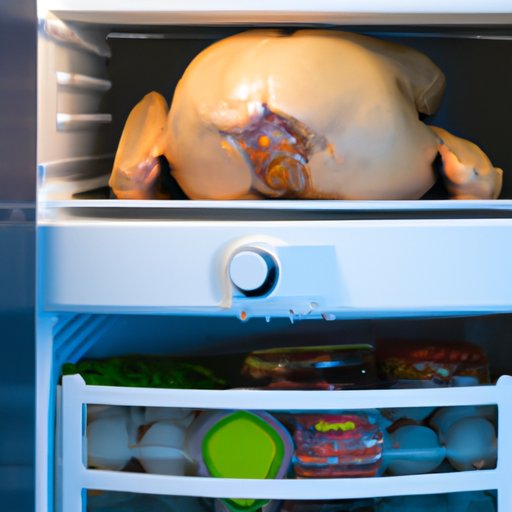Introduction
Cooking a turkey is no small task, and it’s important to make sure that your hard work doesn’t go to waste. Knowing how long you can keep cooked turkey in the refrigerator is key to ensuring that you are able to enjoy the fruits of your labor. This article will explore how to store cooked turkey in the refrigerator for maximum food safety, and outline the factors that will impact its shelf life. Additionally, this article will provide pro tips on maximizing the shelf life of cooked turkey in the fridge.
How to Store Cooked Turkey in the Refrigerator for Maximum Food Safety
When storing cooked turkey in the refrigerator, it is important to follow a few simple steps to ensure maximum food safety. Firstly, it is important to properly cool the cooked turkey before placing it in the refrigerator. To do this, it’s best to divide the turkey into smaller pieces and place them in shallow containers. This will help the turkey to cool more quickly, as the surface area of each piece will be exposed to the cooler air of the refrigerator. Once the turkey has cooled, it should be stored in the coldest part of the refrigerator, which is typically at the back or bottom. Additionally, it is important to ensure that the cooked turkey is covered and sealed to prevent any cross-contamination with other foods in the refrigerator.
How Long Is It Safe to Keep Cooked Turkey in the Refrigerator?
The food safety guidelines recommend that cooked turkey should be kept in the refrigerator for no longer than 3-4 days. However, there are a few factors that can impact the shelf life of cooked turkey in the refrigerator. Firstly, it is important to monitor the temperature of the refrigerator, as fluctuations in temperature can cause bacteria to grow on the turkey, leading to spoilage. Additionally, the type of storage container used is also important. It is best to use an airtight container to ensure that the turkey stays fresh for as long as possible.

How to Ensure Your Cooked Turkey Stays Fresh in the Fridge
To ensure that your cooked turkey stays fresh in the refrigerator, it is important to take a few precautions. Firstly, it is important to monitor the temperature of the refrigerator to ensure that it is consistently between 35-40 degrees Fahrenheit. Additionally, it is important to use the right storage containers. Glass or plastic containers with tight lids are best, as they will help to keep the turkey fresh for longer.
Maximizing Shelf Life of Cooked Turkey – What You Need to Know
If you want to maximize the shelf life of cooked turkey in the refrigerator, there are a few things you need to know. Firstly, it is important to reheat cooked turkey to an internal temperature of 165 degrees Fahrenheit before consuming it, as this will kill any bacteria that may have grown on the turkey. Additionally, it is also possible to freeze cooked turkey for up to 4 months for later use. However, be aware that freezing cooked turkey can reduce its quality and texture.

Pro Tips for Properly Storing Cooked Turkey in the Fridge
To ensure that your cooked turkey stays fresh in the refrigerator, there are a few pro tips you should follow. Firstly, it is important to separate raw and cooked foods in the refrigerator to avoid cross-contamination. Additionally, it is important to utilize leftovers quickly, as cooked turkey can only remain safe in the refrigerator for 3-4 days.
Conclusion
Storing cooked turkey in the refrigerator correctly is key to ensuring that you are able to enjoy the fruits of your labor. This article has explored how to store cooked turkey in the refrigerator for maximum food safety, and outlined the factors that will impact its shelf life. Additionally, this article has provided pro tips on maximizing the shelf life of cooked turkey in the fridge. In conclusion, it is important to ensure that the cooked turkey is cooled properly, stored in the coldest part of the refrigerator, covered and sealed, and monitored for temperature changes. Furthermore, it is important to remember that cooked turkey should not be kept in the refrigerator for longer than 3-4 days.


